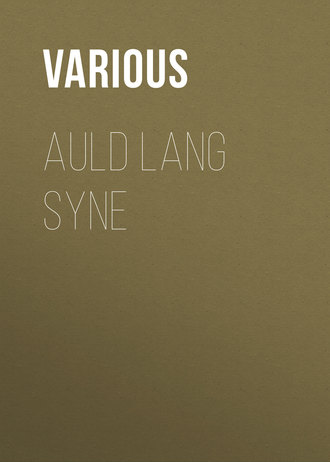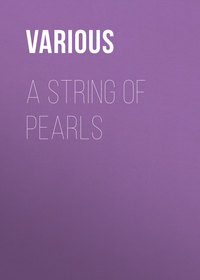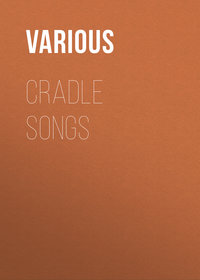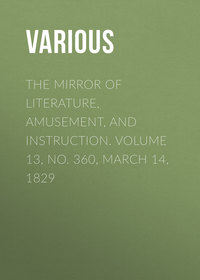
Auld Lang Syne
SILENCE.
(OF A DEAF PERSON.)
I SEE the small birds fluttering on the trees,And know the sweet notes they are softly singing;I see the green leaves trembling in the breeze,And know the rustling that such breeze is bringing;I see the waters rippling as they flow,And know the soothing murmur of their noise;I see the children in the fire-light’s glow,Laughing and playing with their varied toys;I see the signs of merriment and mirth;I see the music of God’s lovely earth;I see the earnest talk of friend with friend,And wish my earnest thoughts with theirs could blend;But oh! to my deaf ears there comes no sound,I live a life of silence most profound.LIGHTS AND SHADOWS
Dear heart! what a little time it is, since Francis and I used to walkFrom church in the still June evenings together, busy with loving talk;And now he is gone far away over seas, to some strange foreign country, – and IShall never rise from my bed any more, till the day when I come to die.I tried not to think of him during the prayers; but when his dear voice I heardI fail’d to take part in the hymns, for my heart flutter’d up to my throat like a bird;And scarcely a word of the sermon I caught. I doubt ’twas a grievous sin;But ’twas only one poor little hour in the week that I had to be happy in.When the blessing was given, and we left the dim aisles for the light of the evening star,Though I durst not lift up my eyes from the ground, yet I knew that he was not far;And I hurried on, though I fain would have stayed, till I heard his footstep draw near,And love rising up in my breast like a flame, cast out every shadow of fear.Ah me! ’twas a pleasant pathway home, a pleasant pathway and sweet,Ankle deep through the purple clover, breast high ’mid the blossoming wheat:I can hear the landrails call through the dew, and the night-jars’ tremulous thrill,And the nightingale pouring her passionate song from the hawthorn under the hill.One day, when we came to the wicket gate, ’neath the elms, where we used to part,His voice began to falter and break as he told me I had his heart;And I whisper’d that mine was his; we knew what we felt long ago:Six weeks are as long as a lifetime almost when you love each other so.So we put up the banns, and were man and wife in the sweet fading time of the year,And till Christmas was over and past I knew neither sorrow nor fear.It seems like a dream already, a sweet dream vanished and gone;So hurried and brief while passing away, so long to look back upon.I had only had him three months, and the world lay frozen and dead,When the summons came which we feared and hoped, and he sail’d over sea for our bread.Ah well! it is fine to be wealthy and grand, and never to need to part;But ’tis better to love and be poor, than be rich with an empty heart.Though I thought ’twould have kill’d me to lose him at first, yet was he not going for me?So I hid all the grief in my breast which I knew it would pain him to see.He’d be back by the autumn, he said; and since his last passionate kissHe has scarcely been out of my thoughts, day or night, for a moment, from that day to this.When I wrote to him how I thought it would be, and he answered so full of love;Ah! there was no angel happier than I, in all the bright chorus above;And I seem’d to be lonely no longer, the days slipp’d so swiftly away;And the March winds died, and the sweet April showers gave place to the blossoms of May.And then came the sad summer eve, when I sat with the little frock in the sun,And Annie ran in with the news of the ship. Ah, well! may His will be done!They said that all hands were lost, and I swoon’d away like a stone,And another life came ere I knew he was safe, and that mine was over and gone.So now I lie helpless here, and shall never rise up again,I grow weaker and weaker, day by day, till my weakness itself is a pain.Every morning the creeping dawn, every evening I see from my bedThe orange-gold fade into lifeless grey, and the old evening star overhead.Sometimes in the twilight dim, or the awful birth of the day,As I lie, not asleep nor awake, my soul seems to flutter away,And I seem to be floating beyond the stars, till I thrill with an exquisite pain,And the feeble touch of a tiny hand recalls me to life again.And the doctor says she will live. Ah! ’tis hard to leave her alone,And to think she will never know in the world the love of the mother who’s gone!He will tell her of me, by and by, – she will shed me a childish tear;But if I should stoop to her bed in the night, she would start with a horrible fear.She will grow into girlhood, I trust, and will bask in the light of love,And I, if I see her at all, shall only look on from above —I shall see her, and cannot help, though she fall into evil and woe.Ah! how can the angels find heart to rejoice when they think of their loved ones below?And Francis, he too, will forget me, and will go on the journey of life,And I hope, though I dare not think of it yet, will take him another wife.It will scarcely be Annie, I think, though she liked him in days gone by;Was that why she came? – but what thoughts are these for one who is going to die?I hope he will come ere I go, though I feel no longer the thirstFor the sound of his voice, and the light of his eye, that I used to feel at first:’Tis not that I love him less, but death dries, like a whirlwind of fire,The tender springs of innocent love, and the torrents of strong desire.And I know we shall meet again. I have done many things that are wrong,But, surely, the Lord of Life and of Love, cannot bear to be angry long.I am only a girl of eighteen, and have had no teacher but love;And, it may be, the sorrow and pain I have known will be counted for me, above;For I doubt if the minister knows all the depths of the goodness of God,When he says He is jealous of earthly love, and bids me bow down ’neath the rod.He is learnèd and wise, I know, but, somehow, to dying eyesGod opens the secret doors of the shrine that are closed to the learnèd and wise.So now I am ready to go, for I know He will do what is best,Though he call me away while the sun is on high, like a child sent early to rest.I should like to see Francis look on our child, though the longing is over and past —But what is that footstep upon the stair? Oh! my darling – at last! at last!ECHOES
On Thursday I sat in the choir of Canterbury Cathedral and watched the Bishops, Deans, Canons, and other clergy as they walked up in procession, leading the new Archbishop. The Archbishop seemed, I thought, to look with sheepish glances at two young men in full ball-room dress, who walked behind, holding up his long train; and I am satisfied that nothing but the proprieties of the place prevented his Grace from kicking them both, and carrying his tail in his own hands. The clergy, in their white gowns, with their various University colours, presented a rather pleasant appearance in the aggregate, and, with the environment of the old Cathedral arches, I thought they must have appeared to the best advantage. But while I gazed upon the old Archbishop and those who were doing him homage, the first notes of a distant chant broke faintly through the air. The choristers had just entered the western door far away, and as they slowly moved at the end of the long procession, they uttered a sweet old Gregorian chant. At first, as I listened, I thought how very sweet it was; then I thought it was in danger of becoming monotonous; nevertheless, the little cherubs had not consulted me about the length of it, and so continued their chant. But then the old music began to strike me with subtle effects, like the strain of some long sound-seasoned Cremona violin. And at length it began to work some strange spell upon me, and weave for my ear echoes caught up as it were from the dead past which before had seemed sleeping in its many tombs around. The echoes of wild pagan song, uttered with the tramp of mystic dances, gathering at last to the dying groan of some poor wretch perishing on a rude altar that a complacent smile may be won to the face of his god. The echo of the voice of a monk who finds that altar, and raises the crucifix above it. His voice blends with the outcry of the people for their old gods, and the loud command of the baptized King. What wild echoes are these hiding under that outburst of young voices? The echoes of a thousand savage martyrs who will not bow down to the Pope. Their protest is stifled with their blood; they pass to Valhalla for whose All-Father they have died; and the howling tempest marks his passage over the scene. Echoes again; the sounds of war. Hark! a tumult – words of anger – a hoarse cry – an Archbishop’s last sigh as his life ebbs away on the floor – there on the spot near the choir’s gate, where Archbishop Tait now gazes as if he could see the stark form of à-Becket lying there. Yes, plainly I heard that groan in the Gregorian chant. Then there were the echoes of stripes. A King in the dark crypt, beneath the shrine of the murdered Archbishop, now canonized, is being scourged in penance for his sins. Blended with these, the echoes of the voices of the great prelates and princes of many kingdoms, who have come to build a shrine for the martyr: their exclamations before the shrine decked with all the gleaming gems owned by the monarchs of Europe. One of them, Louis of France, has refused to offer a diamond, the finest in the world, but when the shrine is uncovered, the stone leaps from his ring and sets itself in the centre of the brilliants. The people shout, nay, weep with excitement at this miracle. All these I heard again in the chant. Then came pathetic echoes out of many ages: the tones of mourners as they followed here their honoured dead; the prayers of souls here aspiring towards the mysteries of existence; voices of hearts that found peace; the sobs of those who found it not; the low-toned benediction or exhortation of confessors. The voices of priests from pulpits, and of those who responded. All are hushed in death; but I heard their awakened echoes. The echoes of tolling bells, of marriage chimes. The tones of marriage vows. The startled cry of the infant wondering at the holy water sprinkled upon it. The echoes of Chaucer’s merry or sad pilgrims with their gracious or wanton stories, beguiling their way to the old inn near Christ Church Gate, which one seeks now only to find it has been burnt down. The echoes of their prayers for health at St. Dunstan’s or St. Thomas’s Shrine, and that other shrine where the stones are worn deepest with the knees of pilgrims, but whose saint is unknown. All these echoes were awakened for my ear by the sweet chant of the boys in Canterbury Cathedral; and unreal as they were, I confess they still seem to me more real than the actual prayers for the confusion of Dr. Tait’s imaginary enemies, or the ceremony of his enthronement. To sit upon fourteen centuries and see a London gentleman in a coat so much too large for him that his friends have to hold up its skirts for him, and to see plethoric Englishmen, suggestive of sirloins, on their knees praying that the snares set for their feet shall be broken, – produced in me feelings, to say the least, of a mixed character; such as those which may have been experienced by the landlady in the Strand, when she found that her lodger Mr. Taylor (the Platonist) had sacrificed a bull to Jupiter in her back parlour. There is something not undignified in an old Greek sacrificing a heifer, laurel-crowned, to Zeus; and there is something not unimpressive in old missionaries of the Cross struggling with pagan foes, and symbolizing their faith in their vesture and in their candles which lit up the caves to which they often had to fly. But to the crowd that went down between business and business, to see so long as a return-ticket permitted this effigy of a real past, there must have been more absurdity than impressiveness in it. From the whole pageant I recall with pleasure only the long sweet chant, – a theme ensouled by genius and piety, – which, between the doorway and the altar, filled the old Cathedral and made it a vast organ, with historic tones breathing the echoes of millions of heaven-seeking pilgrims whose prayers and hymns began at that spot before the advent of Christianity, and may perhaps remain there after it has passed away.
EXPEDIENCY
Thus to his scholars once Confucius said:Better to die than not be rich: get wealth.He who has nothing, trust me, nothing is;Nay, tenfold worse than nothing. Not to beIs neither good nor bad; but to be poor! —’Tis to be nothing with an envious wish,A zero conscious of nonentity.To get wealth, and to keep it – this is all,And the one rule of life, expediency. This was the lesson that the master taught,And then he gave some rules for getting wealth:Happy, who once can say, I have a thing.All things are given us, all things to be had,Except, alas! the faculty of having.If you are sated with one dish of fruit,Why, no more fruit have you, to call it having,Though a whole Autumn lay in heaps about you. How to have, this, my scholars, would I teach.Yet who can teach it? it is great and hard.This one thing dare I say. Be not deceived,Nor dream that those called rich have anything;Who think that what the pocket treasures up,And jealous foldings of the robe, is theirs;Theirs all the plate the burglar cannot reach,Theirs all the land they warn the traveller off:Fools! Because we are poorer, are they rich?What is none other’s, is it therefore theirs? Endeavour, O my scholars, to be rich,Scheme to get riches when you wake from sleep,All day pursue them, pray for them at night. As when one leans long time upon his hand,Then, moving it, finds all its strength is goneAnd it can now grasp nothing, so the soulLoses in listlessness the grasping power,And in the midst of wealth, has nothing still. I know not, O my scholars, how to bringThe tingling blood through the soul’s palsied limbs,But when ’tis done how rich the soul may beHow royal in possessions, I can tell, —One half of wisdom – seek elsewhere the other.The gods divorce knowledge of good from good.He who is happy and rich does seldom know it,And he who knows the true wealth seldom has it. Not only all this world of eye and earBecomes his house and palace of delightsWhose soul has grasping power; so that each formTo him becomes a picture that is his,The light-stream as a fountain in his court,The murmur of all movement music to him,And time’s mere lapse rhythmical in his heart.Not only so; a greater treasure still,The lives of other men, by sympathyIncorporated with his own, are his. Get wealth, my scholars, this wealth first of all.One life is beggary; live a thousand lives.In those about you live and those remote;Live many lives at once and call it country,And call it kind; in the great future liveAnd make it in your life rehearse its life,And make the pallid past repeat its life.Be public-hearted and be myriad-soul’d,So shall you noble be as well as rich,And as a king watch for the general good.Raised to a higher level, you shall findWith large enjoyments vast constraints, vast cares.Be swayed by wider interests, be touchedBy wiser instincts of the experienced heart,And, since all greatness is a ponderous weight,Be capable of vaster sufferance.Your joys shall be as heaven, your griefs as hell. Rise early, O my scholars, to be rich,And make Expediency your rule of life. Then, when the utmost scale of wealth is gain’d,And other lives are to your own annex’dBy the soul’s grasping power, this guide of life,This sure Expediency, shall suffer change. When appetites shall tame to prudencesAnd Prudence purge herself to Sacred Law,When lusts shall sweeten into sympathies,And royal Justice out of Anger spring,When the expanding Self grows infinite,Then shall Expediency, the guide of life,In Virtue die, in Virtue rise again.REST. 1
Dearest Friend,
The subject of your meeting of to-morrow is so suggestive that I would gladly join you all, and write an essay on it, if I had health and time. I have neither, and, perhaps, better so. My essay, I candidly avow, would tend to prove that no essay ought to be written on the subject. It has no reality. A sort of intuitive instinct led you to couple “Ghosts and Rest” together.
There is, here down, and there ought to be, no Rest. Life is an aim; an aim which can be approached, not reached, here down. There is, therefore, no rest. Rest is immoral.
It is not mine now to give a definition of the aim; whatever it is, there is one, there must be one. Without it, Life has no sense. It is atheistical; and, moreover, an irony and a deception.
I entertain all possible respect for the members of your Club; but I venture to say that any contribution on Rest which will not exhibit at the top a definition of Life will wander sadly between wild arbitrary intellectual display and commonplaces.
Life is no sinecure, no “recherche du bonheur” to be secured, as the promulgators of the theory had it, by guillotine, or, as their less energetic followers have it, by railway shares, selfishness, or contemplation. Life is, as Schiller said, “a battle and a march;” a battle for Good against Evil, for Justice against arbitrary privileges, for Liberty against Oppression, for associated Love against Individualism; a march onwards to Self, through collective Perfecting, to the progressive realization of an Ideal, which is only dawning to our mind and soul. Shall the battle be finally won during life-time? Shall it on Earth? are we believing in a Millennium? Don’t we feel that the spiral curve through which we ascend had its beginning elsewhere, and has its end, if any, beyond this terrestrial world of ours? Where is then a possible foundation for your essays and sketches?
Goethe’s “Contemplation” has created a multitude of little sects aiming at Rest, where is no Rest, falsifying art, the element of which is evolution, not re-production, transformation, not contemplation, and enervating the soul in self-abdicating Brahmanic attempts. For God’s sake let not your Club add one little sect to the fatally existing hundreds!
There is nothing to be looked for in life except the uninterrupted fulfilment of Duty, and, not Rest, but consolation and strengthening from Love. There is, not rest, but a promise, a shadowing forth of Rest in Love. Only there must be in Love absolute trust; and it is very seldom that this blessing depends on us. The child goes to sleep, a dreamless sleep, with unbounded trust, on the mother’s bosom; but our sleep is a restless one, agitated by sad dreams and alarms.
You will smile at my lugubrious turn of mind; but if I was one of your Artists, I would sketch a man on the scaffold going to die for a great Idea, for the cause of Truth, with his eye looking trustfully on a loving woman, whose finger would trustfully and smilingly point out to him the unbounded. Under the sketch I would write, not Rest, but “a Promise of Rest.” Addio: tell me one word about the point of view of your contributors.
Ever affectionately yours,Joseph Mazzini.REST
Poor restless heart! still thy lament,Crave not for rest, refusèd still,There is some struggle, – discontent, That stays thy will.Be brave to meet unrest,Nor seek from work release,Clasp struggle close unto thy breast, Until it brings thee peace.Seek not in creed a resting-placeFrom problems that around thee surge,But look doubt bravely in the face, Till truth emerge.Work out the problem of thy life,To no convention chainèd be,Against self-love wage ceaseless strife, And thus be free.Then, if in harmony thou livest,With all that’s in thy nature best,Who “Sleep to his beloved giveth,” Will give thee rest.REST
His Mother was a Prince’s child, His Father was a King;There wanted not to that proud lot What power or wealth could bring;Great nobles served him, bending low, Strong captains wrought his will;Fair fortune! – but it wearied him, His spirit thirsted still!For him the glorious music roll’d Of singers, silent long;Grave histories told, in scrolls of old, The strife of right and wrong;For him Philosophy unveil’d Athenian Plato’s lore,Might these not serve to fill a life? Not this! he sigh’d for more!He loved! – the truest, newest lip That ever lover pressed,The queenliest mouth of all the south Long love for him confess’d:Round him his children’s joyousness Rang silverly and shrill;Thrice blessed! save that blessedness Lack’d something – something still!To battle all his spears he led, In streams of winding steel;On breast and head of foeman dead His war-horse set its heel;The jewell’d housings of its flank Swung wet with blood of kings;Yet the rich victory seem’d rank With the blood taint it brings!The splendid passion seized his soul To heal, by statutes sage,The ills that bind our hapless kind. And chafe to crime and rage;And dear the people’s blessing was, The praising of the poor;But evil stronger is than thrones, And hate no laws can cure!He laid aside the sword and pen, And lit the lamp, to wrestFrom nature’s range the secrets strange, The treasures of her breast;And wisdom deep his guerdon was, And wondrous things he knew;Yet from each vanquish’d mystery Some harder marvel grew!No pause! no respite! no sure ground, To stay the spirit’s quest!In all around not one thing found So good as to be “best;”Not even love proved quite divine; Therefore his search did cease,Lord of all gifts that life can give Save the one sweet gift – Peace!Then came it! – crown, sword, wreath – each lay, An unregarded thing!The funeral sheet from head to feet, Was royal robe to that king!And strange! – Love, learning, statecraft, sway, Look’d always on before,But those pale, happy, lips of clay, Lack’d nothing! – nothing more!GOSSIP
I FEEL impelled to say a word, and it shall be but a word – and so more patiently endured – in defence of that much abused, much maligned thing – gossipry. Johnson, among many other designations, gives for “gossipred,” “spiritual affinity;” a very good definition, and the one I shall adopt; that is, sympathy, the need to give and to receive it; and I must say I know few things more charming than this sympathy in small things, this gossipry between kindly hearts and well filled heads. That light pouring out the thoughts and feelings and observations of the passing hour, which, while it commences with the external, is sure to touch, ever and anon, those deeper springs of thought, and feeling, and action, from which well up pleasant memories, apt thoughts, and pertinent reflections.
Poring over old letters and papers which chanced recently to come into my hands, I came upon an old leaf of yellow paper and faded ink, which caught my attention; it appeared to be either a scrap of an old diary, or of a letter; it seemed to me somewhat germane to our present subject, and being venerable from its antiquity, I venture to quote it. Its date is too indistinct to be sure of, but it seems to be 1700 and something. Thus it runs: – “My husband was bidden to dinner yesterday to our Rector’s, I with him; my husband was pleased thereat, because there was, he said, to be there a man of parts, from London; so I laid out my husband’s best coat and long flowered waistcoat, and his kerseys and silk stockings, which he did not often wear, for I desired him to be seemly in his attire, that he might do fitting honour to our Rector; I was a little flustered at first with the notion of this great man; but I noted that my husband bore himself towards him exactly as if he had been an ordinary man. At table I found myself set next to him. The gardens at the great house are very fine, and kept excellently well, as indeed is not wonderful, as there are two whole gardeners and a boy to do the work. Looking out of the large bay-window which looked upon the flower garden, and stood open, for it was mighty warm, I could not keep my eyes off the flowers, they were so exceeding gay; the sun shone out surprisingly; one spot in particular took my attention: a large clump of daffodils had been allowed on the lawn, the grass was high round them, and on the top of every blade there was a drop that sparkled like a diamond – for there had been a slight shower – and as I looked upon them, I thought of the description in holy writ of the gates of the temple of Jerusalem, all studded with sapphires and emeralds and diamonds; and I was so taken up that I forgot it was the great man that was sitting by me, and I asked him if it was not beautiful? ‘It is vastly fine indeed, ma’am,’ he said; but he looked at me with wonderment, I thought, and from the look in his eyes, I am sure he did not know a daffodil from a daisy, poor man. So I felt very much abashed, and sat still and said no more; and there was not much discourse, but everybody looked wise and silent; and I remembered that somewhere it is said, it is a grand thing to know how to be silent; but I thought a little talking would have been more agreeable, only perhaps not so wise-like, only of course I knew I was quite a common person, and had no parts at all; so when it was about three of the clock – the hour fixed for the dinner was rather late, as it was a bye common occasion – and we ladies left the gentlemen to settle down to their wine, I thought I would go home to my children, for I thought our lady Rector looked somewhat puffed up and stately with the great honour she had had, and done to us; and to say the very truth, I felt longing to speak and to hear in the ordinary way. So I took my leave in a beseeming and courteous manner, and stepped across to my own place; and my eldest daughter came running to me and said she had got so many things to tell me; and then out of her little heart she poured out all her little troubles and pleasures; and oh! she said, little brother had been so naughty, and had cried dreadfully for the pretty cup from China, and stamped and fought her when she would not let him have it, because dear mamma liked it so much, and would be sorry to have it broken. ‘But then, mamma,’ she said, ‘when he got a little quieter, I talked to him, and hushed him and kissed him, and so he was soon good, and we had a great game at horses.’ Then I kissed the little maid, and called her a ‘dear little mother,’ but she was greatly puzzled, and said, ‘Oh, mamma, I am only a little girl.’ Then she said I must tell her all about the gentleman that she had heard papa say had a great many parts – ‘more, I suppose, mamma, than any of us.’ I only kissed her at this, and told her of the golden daffodils and many other flowers I had noticed; and of two great blackbirds I had seen hopping very lovingly together upon the lawn. She said she liked to hear of these extremely; and I told of the roast sucking-pig with an orange in its mouth, which was at the top of the table; but she did not like this; she said it would remind her of the little piggy running about, which that little pig would never do any more. Then she said she would tell me of one of her little misfortunes, which she thought was almost a big one: ‘the poor brown hen with ten little chicks had been shut up by themselves, because the little chicks would run about too far; and the boy had forgotten them, and they had been shut up without anything to eat for ever so many hours; and when we put some barley in, dear old browney clucked and clucked, and showed the grains to the chicks, but never touched one herself, mamma, and when the little chicks had eaten till they were quite full, she called them all under her wings, and they went fast asleep; but then, mamma, there was not one single barley left near the poor mother; and so I do believe mamma, she would have been quite starved to death, only we put some barley and some nice crumbs quite close to her; so she got them without moving a bit, or waking the chicks, and oh, mamma, she did gobble it up so fast; I know she was so hungry, for she did not eat one single barley-corn before, for I watched her all the time; wasn’t it sweet and good of her, mamma? I shall love that dear old browney for always.’ And so my little daughter and I chatted away and enjoyed ourselves hugely, till my dear good man, who I had thought was sitting over his wine, and perhaps his pipe – but I don’t know about that because of the company – came suddenly behind us. He kissed us both, saying, ‘My two sweet gossips, it does my heart good to hear you. It seems to me, my Margery,’ he said, ‘that our little one here hath both a sound heart and a wise head.’”









